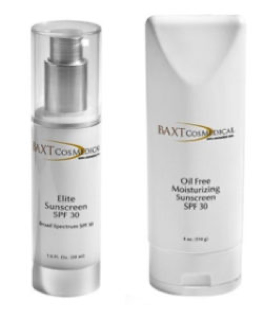
Did you know that skin cancer makes up over half of all new cancers in the United States? There are more cases of skin cancer diagnosed each year than all other types of cancer combined. Anyone can get skin cancer!
Let’s review the facts according to the Skin Cancer Foundation:1
- 1 in 5 Americans will develop skin cancer by the age of 70
- Having 5 or more sunburns doubles your risk for melanoma
- Each year, there are more than 3 million cases of skin cancer
- More than 2 people die of skin cancer in the United States every hour
Dr. Rebecca Baxt, a board-certified dermatologist, encourages everyone to get screened annually because the good news is that when detected early, the 5-year survival rate for melanoma is 99%!
What Are The Different Types Of Skin Cancer?

There are three main forms of skin cancer:
- Basal Cell Carcinoma
- Squamous Cell Carcinoma
- Malignant Melanoma
Basal Cell Carcinoma (BCC) and Squamous Cell Carcinoma (SCC) are often found on skin exposed to the sun (face, neck, and arms). Other areas of the body can also be affected. Both are very common and can be treated if caught in time. Left untreated, BCC can become locally aggressive, and disfiguring and SCC can be deadly, so don’t put off your cancer screening until next year.
Malignant Melanoma is less common than basal and squamous cell cancer, but it is the most dangerous form of skin cancer because of its rapid ability to spread to other organs. The cancerous growth leads the skin cells to multiply quickly and form malignant tumors. Melanoma is a serious disease that requires early diagnosis and treatment.

Skin cancer can appear anywhere on your body. Melanomas often resemble moles and some melanoma develops from moles.
Dr. Baxt advises her patients that when you undergo regular skin care screenings by a dermatologist, you increase your chances of a skin cancer lesion being caught in an early, treatable stage. If you haven’t already, schedule your annual skin cancer screening, do so today!
What Causes Skin Cancer?
The majority of cases of skin cancer are caused by excessive exposure to ultraviolet (UVA/UVB) rays, usually from sunlight. In some cases, skin cancer forms from manmade sources like tanning beds or sun lamps. Fair-skinned individuals are at a higher risk and burn more quickly than darker skin, but the sun’s UV rays can still cause damage and cellular changes that lead to skin cancer on all types of skin tone.
Another significant factor is heredity. Family history of a close relative with melanoma significantly increases your risk of developing melanoma. You must take extra care in protecting your skin and getting screened by a dermatologist.
People mistakenly believe that they aren’t at risk because they use sunscreen, but Dr. Baxt finds that most people don’t apply enough of it, re-apply it often enough, or cover vulnerable areas such as the ears and scalp. Read on to learn how you can best protect yourself from skin cancer.
Skincare Protection Tips
You can help protect yourself and your loved ones from skin cancer by following these tips from Dr. Baxt:
- Minimize your exposure to UV rays, especially between the hours of 10 AM and 4 PM.
- If are in the sun, wear protective clothing and a wide-brimmed hat.
- Always apply a good quality sunscreen with SPF 30 or higher on all exposed skin. You can get a sunburn on cloudy days too!
- Reapply sunscreen every two hours when you are in direct sunlight.
- Be sure to schedule annual skin cancer screenings.
During your skin cancer screening, Dr. Rebecca Baxt informs patients that skin cancer can appear on different areas of your face and body. She carefully examines all of your skin, including your scalp, fingernails, toenails, palms, and the soles of your feet.
Dr. Baxt also treats pre-cancers before they become skin cancers with Photodynamic Therapy (PDT).
Call (201) 265-1300 or contact us online to schedule your skin cancer screening with Dr. Rebecca Baxt.
Take The Challenge!
Skin Cancer Awareness Month is the time to get screened! Share the facts: #SkinCheckChallenge
Related Blogs
Skin Cancer Awareness: The Truth Behind this Disease
1Skincancer.org, 2022 January, Skin Cancer Facts & Statistics, Skin Cancer Foundation, https://www.skincancer.org/skin-cancer-information/skin-cancer-facts/

